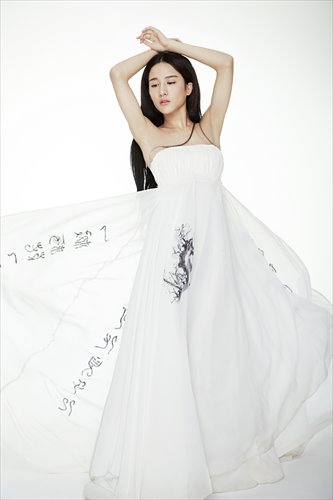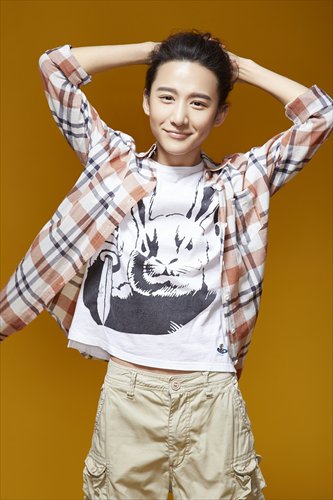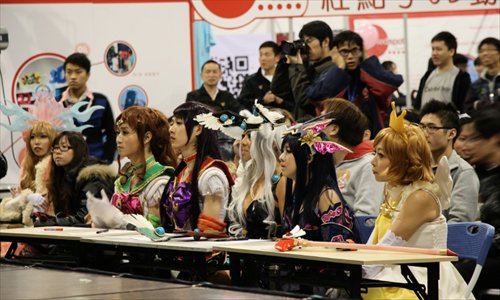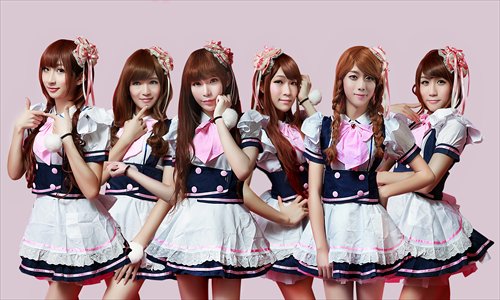Drag to riches

Cross-dressing actor Lu Zhuo poses as his feminine persona Xiao Can. Photo: Courtesy of Lu Zhuo

Lu as his natural self without makeup. Photo: Courtesy of Lu Zhuo
Just over a month ago, a series of sexy photos featuring 22-year-old Lu Zhuo went viral online. Dressed in a long, flowing dress and hair styled in a neat bun, Lu exuded the beauty of a Chinese mythological goddess. Gushing comments accompanied the photos widely circulated on social media.
Making the photos all the more remarkable is the fact Lu, better known by the stage name Xiao Can, is actually a man.
"People always ask me whether I've seen myself as a beautiful girl since childhood, but I'm not like that. I'm not a freak," said Lu, who shot to fame in June 2012 after appearing on I Am Legend, a variety show produced by video-sharing website Youku.
Lu is the latest in a long line of Chinese male performers to achieve success dressed as women. Just like the past and present Peking opera stars Mei Lanfang (1894-1961) and Li Yugang, both of whom are famed for their portrayal of dan (female) characters, Lu has made a lucrative living as a cross-dresser.
But he insists his line of work as an actor is more rewarding than the spoils of Peking opera.
"I think I have much more fun doing what I do," Lu said.
Bending gender stereotypes
Originally from Zhengzhou, Henan Province, Lu moved to Beijing in mid-2013 to capitalize on work opportunities. Born to teenage parents, Lu was raised by his grandparents who both support his career path. His grandmother even helps him apply makeup before shoots.
In addition to his large almond eyes, high cheekbones and slender legs, Lu doesn't have much body hair or a visible Adam's apple. Standing 1.74 meters tall and weighing just 46 kilograms, Lu's delicate frame is the envy of many of his female fans.
His short, straight mop is normally tucked under a fashionable trucker's cap, but when he adopts his feminine identity for the camera it transforms into a bun or ponytail courtesy of hair extensions.
Meeting Metropolitan one evening last week at a beauty salon he visits regularly for laser hair removal and facials, Lu was still weary from the previous night's film shoot. His work schedule is busy, with Xiao Can in constant demand from TV producers across the country.
"I wear short skirts and high heels to entertain people and myself, but I don't want people to think of Xiao Can as seductive and I don't consider myself a weiniang," said Lu, referring to the Chinese term for cross-dressing men that literally means "fake girl."
"Many people say I'm an example of boys being increasingly effeminate these days. But at the end of the day I'm just an actor," he said, adding he hopes in future to perform male roles and study at the Beijing Film Academy.
Dubbed by netizens as the "most beautiful weiniang," Lu said he prefers his other title of "shenxian gege" ("fairy brother") because "at least the gender is right."
Lu isn't the first male cross-dressing sensation from China's post-1990s generation. The name most commonly associated with the term "weiniang" in the country is Liu Zhu, a 19-year-old Sichuan native who starred on Hunan Satellite TV's Happy Boy singing contest in 2010.
A cross-dresser on and off stage, Liu raised many eyebrows and was booted prematurely from the show allegedly under pressure from broadcasting authorities.
"What wrong did [Liu] do? He was forced out because of the media hype," Lu said, lighting a cigarette. "What I do is only on stage. I don't go out in public wearing high heels, a bra and pantyhose. My success will be judged when I play a bad guy and viewers hate me, or I play a good guy and viewers adore me. But I'm just a beauty for now."

Performers from the AWG attend a comic convention. Photo: Courtesy of Hua Junzhe
Hua Junzhe (third from right) with cross-dressing performers from the Alice Weiniang Group at a show marking the troupe's fourth anniversary on October 1, 2013. Photo: Courtesy of Hua Junzhe
Alice in 'Weiniang-land'
Although some cross-dressing performers like Lu shun the weiniang tag, others embrace it. One of the country's most well-known troupes of drag performers is the Alice Weiniang Group (AWG) based in Wuhan, Hubei Province.
Requirements for prospective members are simple. You must be male, at least 18, slender, have soft facial features and a "feminine" body figure without broad shoulders.
Founded in 2009, the troupe initially only comprised nine members. Today, it has grown to 200 members who include singers, dancers, photographers, makeup artists and wardrobe stylists. Hua Junzhe, the AWG's founder and director, said most members are university students.
Hua, 23, explained he has "learned many tricks over the years" for young men to convincingly resemble girls.
For example, choosing wigs with blunt fringes and locks on both sides help conceal masculine, angular facial features. Tops with long sleeves can cover muscular arms, while full, fluffy skirts are better than pants at hiding male curves. Hua also advises performers to tilt their heads down at roughly a 45-degree angle to look better on camera and conceal any unsightly Adam's apples.
The troupe's stars earn a monthly bonus of around 5,000 yuan ($827) during the peak performance season, which spans the year-end period.
Hua struggled to win acceptance of what he does from his parents, who once grounded him for a week in a bid to deter him from his unconventional entertainment ambitions.
It wasn't until Hua took his parents to see a rehearsal that they began to see things differently. "Gradually, they realized we are just a bunch of kids having fun. We're just a bit different," said Hua, who explained his parents now even comfort him when he feels down from reading online slurs directed toward his troupe.
Hua believes family support is essential to bring out the best in his performers.
"The last requirement [for joining the AWG] is that your parents must be aware of what you are doing and agree with it," said Hua.

Suspicions over sexuality
Despite both Hua and Lu plying their craft as cross-dressing performers, each targets a different audience.
Lu stars in as yet unaired TV dramas, while Hua's group mainly performs at comic conventions for live audiences.
The AWG boasts a passionate following of fans, some of whom cry at their performances and travel around the country to see their shows. Hua said one of his craziest fans used to frequently call him when drunk late at night and beg him to marry her.
Surprisingly, Hua said most fans at their shows are young men.
"I was bewildered that so many people liked us," Hua said of the group's early success. "[Fans] are influenced by Japanese manga. Girls [to them] aren't that special anymore, so when a group like ours shows up with our tiny waists and long legs, they are immediately drawn to our cute comic-like elements. Of course, being guys adds to the novelty of our act."
Hua has a girlfriend who is an avid fan of manga and the AWG. "We met at a comic convention's book-signing event," he said. "She supports me because she knows we can separate [work from life]. The stage is the stage, and life is life."
The first question many curious outsiders have about male cross-dressing performers is about their sexuality, but Hua said most performers in his troupe are straight with their own girlfriends.
"We don't feel offended [about homosexuality suspicions] because we understand it comes with the territory. Those who don't understand or can't live with [the pressure] don't last," he said.
As a bachelor, Lu said he receives frequent romantic offers from men and women. Many people, including reporters, have asked him about his sexual orientation. Even though Lu has repeatedly claimed he is straight and alluded to his girlfriends during university, it hasn't silenced his critics.
"At first, I was very angry about it. I sometimes had nightmares about the vitriolic attacks people made against me online," said Lu.
Coping with critics
Despite their support from fans and family, Lu and the AWG's performers have been criticized and threatened by many people online who don't appreciate their act.
"We used to feel really bad at first because we really cared about other people's opinions," said Hua, whose troupe has been denounced as "transvestites," "freaks" and "Chinese ladyboys" by some netizens.
Inaccurate media reports have also fueled discontent at cross-dressing performers in China.
"One report said we claimed to have established a 'new artistic medium' and were students of Mei Lanfang, both of which were false statements," said Hua. "We don't dare compare ourselves [to Peking opera greats]. They are the real artists and we are only offering a new, distinctive type of performance."